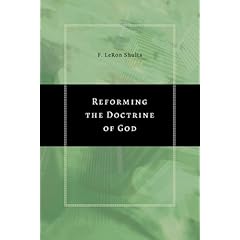F. LeRon Shults, Reforming the Doctrine of God
 In Reforming the Doctrine of God, LeRon Shults takes a sustained look at theology proper, but he does it with an important contemporary twist. Shults asserts that theology must be done as a "messy reciprocity between our ideas about God and everything else" (12). That is, theology is (inevitably) conditioned by our understanding of the world, just as it conditions that same understanding. It is with this basic insight in mind that he sets out to reform the doctrine of God.
In Reforming the Doctrine of God, LeRon Shults takes a sustained look at theology proper, but he does it with an important contemporary twist. Shults asserts that theology must be done as a "messy reciprocity between our ideas about God and everything else" (12). That is, theology is (inevitably) conditioned by our understanding of the world, just as it conditions that same understanding. It is with this basic insight in mind that he sets out to reform the doctrine of God.
Why reform? The reason, as laid out in the first part of the book, is because too much of theology has been inextricably linked with outmoded philosophical categories that see God as immaterial substance, single subject, and first cause. These categories, he asserts, lead to problems with our thinking about God that are created more by the categories than by the reality they seek to illuminate. In the second part of the book, Shults looks at a number of "late modern" trends that can prove as resources to reinvigorate our thinking about God by overcoming some of the philosophical barriers of modern thinking. Specifically, he looks at divine infinity, the trinity, and eschatological ontology as three important streams of thought that are reshaping how we think of God.
In this review, I'm not going to try to expound either of these parts in detail, for a couple of reasons. First, and probably most important, philosophical theology is not my own specialty, and I fear any summary I give would only distort his points, rather than illuminating them. Second, he draws on a broad range of streams of modern and late modern thought in his critiques and constructions, and a concise summary would not do them justice, especially if you aren't already familiar with his subjects. But, a few comments will hopefully give at least some insight in to where he is going.
Shults demonstrates, successfully, I think, that some of the classic dilemmas in theology, such as how God works in the world or how divine sovereignty and human freedom are compatible, are at least in part caused by assumptions and categories that are foreign to the Bible. His second point, worked out in part two, is that many late modern thinkers have begun to rethink some of these basic assumptions and have collectively reclaimed some important ways of thinking about God that have been too often lost or diminished in modern theological thinking. And in each chapter he surveys a number of important thinkers from a variety of perspectives, such as Karl Barth, Jürgen Moltmann, Wolfhart Pannenberg, and John Zizioulas, to show the sources and contours of these important developments. The three streams that are recovered focus on God's infinity (God is more than just "extensively" greater than creatures but is genuinely "other"), trinity (God is not a single substance or mind but is dynamic relationality in himself), and futurity (God relates to time not only as its originator but as its upholder and as its future hope and consummation). All of this is helped by what he calls a "turn to relationality" in philosophy, with a movement away from a more substance-based view of reality to the acknowledgment as relationship or relationality as basic to the constitution of what it means to be person.
It is in part three that the the real "reforming" takes place, as Shults seeks to rebuild the doctrine of God through a critical appropriation of many of the late modern trajectories into a constructive exposition of theology. He looks at God's knowing, acting, and being through the themes of omniscient faithfulness, omnipotent love, and omnipresent hope. As with the first two parts, I won't try to recreate the flow of his argument. Instead, I want to note that he takes head on three of the thorny (and fascinating) issues that confront theology, the "antinomies" of divine foreknowledge, divine predestination, and divine timelessness. In each case, he surveys the state of the discussion and proposes a way forward that liberates the discussion from the classic categories that create the problems in the first place. In each case, I found his proposals to be insightful and liberating while remaining true to the core biblical insights that provide the foundation for the discussions. Just these three discussions are easily worth the price of the book, but I think the book's greatest value is that the "solutions" to these three problems point toward a richer and more dynamic doctrine of God.
I read the whole third part of this book with growing appreciation and excitement, and I look forward to delving in to Shults's other books and seeing how his vision plays out across the various ares of theology. But I know that the groundwork laid here is deeply valuable. It certainly struck a chord with me both in its freshness and its faithfulness. I look forward to rereading these final chapters again as I reflect on who God is and how we think of him. This book is highly recommended, though it certainly contains a lot of technical language. It is at times a rather difficult read, but it will repay a careful reading. For anyone who is interested in contemporary evangelical theology, this book is essential reading, and is a profound example of a vibrant and delightful investigation and appreciation of who God is.




